February 22, 2024 Policy Hearing Takeaways
February 22, 2024
A State Lost in Addiction: Pennsylvania’s Path to Recovery
The scourge of addiction, particularly opioids, has deeply affected families across Pennsylvania, prompting urgent action and discussion within the state legislature and our communities. On February 22, 2024, at the request of Rep. Marla Brown the Pennsylvania House Republican Policy Committee convened a crucial hearing in New Castle to shed light on the pervasive impact of addiction while exploring pathways to recovery and solutions to combat this crisis. The testimony presented by a diverse panel of experts underscored the multifaceted nature of addiction and highlighted the critical role of legislative initiatives and community engagement in fostering hope for Pennsylvania's future.
The testifiers that joined the Policy Committee were as follows:
Understanding Community Impact Panel
Hon. Joshua D. Lamancusa - District Attorney, Lawrence County
Hon. Richard M. Johnson - D-ABMDI, Coroner, Lawrence County
Questions for the Understanding Community Impact Panel
Understanding Recovery Panel
Vaughn Crisci - Advocate for Recovery
Angelo Papa, Esq. - Owner, Angelo A. Papa P.C.
Dr. Mark Matta - CEO and Medical Director, Psych Med Associates, P.C.
Questions for the Understanding Recovery Panel
| Agenda - Bios – Testimony |
| Understanding Community Impact Panel |
D.A. Lamancusa called for legislative and social changes, including the implementation of Mandatory Minimums for drug dealers, highlighted the urgent need for policy interventions to combat the opioid epidemic and reduce recidivism rates. When drug dealers are forced off of our streets for a set period of time, we can have some assurance that their products can no longer harm our communities.
The geographic nature of Lawrence County, with highways connecting to Detroit, Pittsburgh, and Youngstown, places the county in the crosshairs of nationwide drug traffickers. During COVID, when the border was closed, there was a noted decrease in the flow of narcotics to the county. The flow of people and products into both our country and Lawrence County must be monitored.
Once arrested there is little guarantee that a drug user or distributor will adjust their lives for the better. State correctional institutions have a 50%-70% recidivism rate, with offenders frequently returning to their ways following release. To combat this, Lawrence County began “Jails to Jobs” in 2014, enabling more than 500 felons to find jobs in their community. Employers receive federal bonding and tax credits for their involvement, and recidivism has been reduced to only 15%-20%. Programs like “Jail to Jobs” inspire hope in people at their lowest, and enable our communities to offer supports while empowering our workforce.
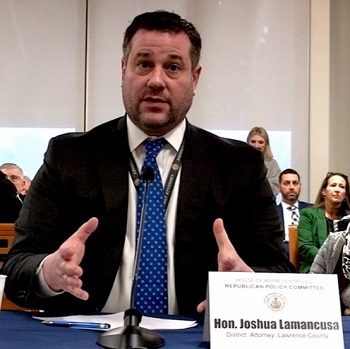 |
| WATCH |
| “We cannot arrest our way out of this nationwide nightmare.” Hon. Josh Lamancusa District Attorney, Lawrence County |
Coroner Richard M. Johnson echoed D.A. Lamancusa's concerns, shedding light on the deadly consequences of fentanyl contamination in Pennsylvania's drug supply. Johnson's grim warning that no drug can be considered "safe" due to potential fentanyl adulteration underscored the urgent need for comprehensive strategies to address substance abuse and prevent overdose deaths. With each passing year more drugs are being mixed with fentanyl and being sold to unsuspecting buyers, resulting in overdoses and death. Coroner Johnson emphasized the global nature of the opioid supply chain, with precursor chemicals originating from China and entering the United States through porous borders, urging collaborative efforts to disrupt drug trafficking networks and stem the flow of deadly substances into Pennsylvania.
An emerging concern throughout the Commonwealth is the increasing prevalence of xylazine, an animal tranquilizer, included in traditional opioids. This additive, AKA Tranq, extends the length of the high at the cost of increased overdose risk and the inability to be saved through the application of Narcan. Narcan, which can be administered to immediately suppress an opioid overdose, has saved countless Pennsylvanians but is powerless against tranquilizers. Because Narcan is unable to combat a “tranq” overdose 4 in 5 overdoses in Lawrence County now include xylazine.
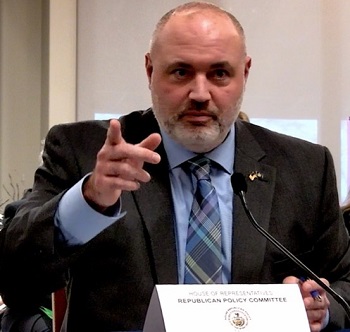 |
| WATCH |
| “We’ve lost mothers, fathers, brothers, sisters, children… the whole gamut.” Hon. Richard M. Johnson Coroner, Lawrence County |
| Understanding Recovery Panel |
Transitioning to the Understanding Recovery Panel, Vaughn Crisci, Advocate for Recovery, shared his perspective as a local resident and father. Vaughn lost a son to addiction, and his daughter has worked diligently to address her own history of drug misuse and to inspire others to better themselves. Vaughn highlighted the pervasive stigma faced by individuals in recovery and the critical need for supportive environments and comprehensive resources. The stigma tied to a person undergoing recovery impedes a person’s ability to pursue a career, form relationships, and make the changes necessary to fundamentally change their life. When a person in recovery must jointly contend with the excruciating pains of dope sickness and unwavering societal stigma, a clean life can seem impossible.
Vaughn shared the importance of speaking candidly with your children. Kids will learn about drugs whether we like it or not, and it is always better to learn from parent and experts instead of a drug dealer. Also, Vaughn noted that if you are experiencing a substance use disorder you may find hope and understanding through a conversation with someone who has undergone recovery already. Those who’ve experienced the hardship and trauma of illicit drug use are often most able to empathize with others and empower them to change their lives.
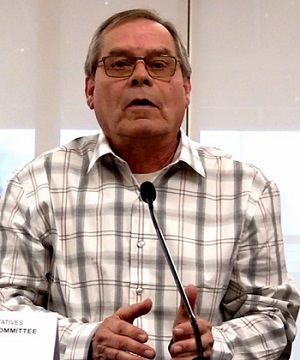 |
| WATCH |
| “There is no greater pain than having to bury a child.” Vaughn Crisci Advocate for Recovery |
Dr. Mark Matta, CEO of Psych Med Associates, provided critical insights into the complex interplay between substance abuse disorders – which impact ~15% of our population - and underlying mental and physical health conditions. Mental health and substance abuse are directly intertwined, and by encouraging positive mental health we can limit the prevalence of substance abuse. Being “high on life” is entirely possible and is vastly preferable to the opioids terrorizing our communities.
Dr. Matta's emphasis on evidence-based treatments, such as agonist and antagonist therapies, highlighted the importance of comprehensive, personalized approaches to addiction treatment that address the multifaceted needs of individuals in recovery. These therapies provide a clinical means of combatting addiction. Agonist therapies, such as methadone and buprenorphine, activate opioid receptors and lessen opioid cravings. Antagonist therapies, such as naltrexone, block the chemical effects of opioids. Both means of clinical therapy can assist with combatting addiction, but there is still a risk of overdose if substance use continues.
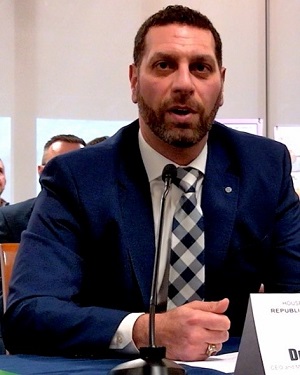 |
| WATCH |
| “Substance abuse disorders must be approached as a multifactorial disease state.” Dr. Mark Matta CEO, Psych Med Associates |
Attorney Angelo Papa emphasized the correlation between education and crime, advocating for holistic approaches to addiction treatment that encompass education, legal guidance, and support services. His emphasis on individual agency in the recovery process, where a substance user must WANT to quit on their own accord, underscored the importance of addressing the underlying factors driving substance abuse and fostering a genuine desire for change.
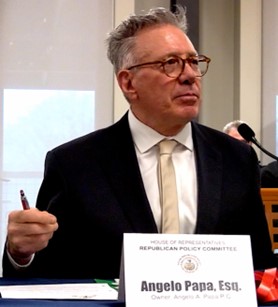 |
| WATCH |
| “Prevention is the most effective and affordable treatment strategy.” Angelo Papa Attorney, Angelo A. Papa P.C |
The insights gleaned from the testimonies presented during the hearing underscored the urgent need for collaborative, evidence-based solutions to combat Pennsylvania's opioid crisis. From the frontline perspectives of law enforcement and medical professionals to the voices of advocates and individuals in recovery, the hearing illuminated the multifaceted nature of addiction and highlighted the importance of legislative initiatives, community engagement, and comprehensive support services in fostering hope and healing for affected individuals and communities. As Pennsylvania charts its path towards recovery, the lessons learned from this hearing will serve as a guiding beacon for legislative action and collective efforts to combat addiction and build a healthier, more resilient future for all Pennsylvanians.